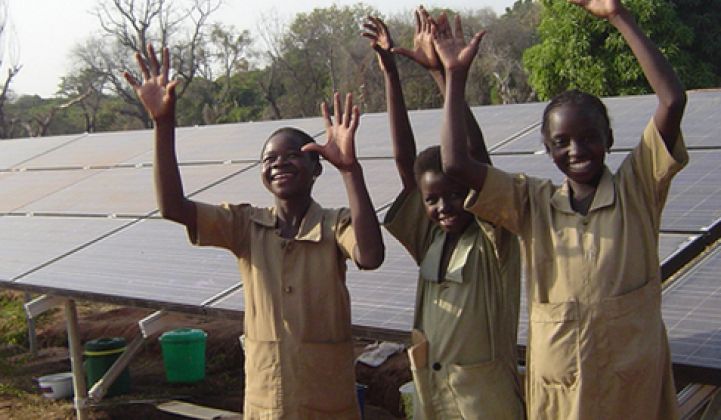The number of new entrants in clean energy’s next big market is increasing by the day.
However, the market is still in its infancy, making announcements like BBOXX's $3 million pre-Series A revenues significant.
Now Impact Energies has achieved another milestone for this nascent industry: its first exit. The firm was just acquired by Persistent Energy Partners, a pay-as-you-go solar provider.
Impact Energies is an interesting story. It’s an off-grid company working outside the usual hotspots of East Africa, India and Bangladesh. Instead, it works in West Africa, which is "both a blessing and a curse," according to founder Hugh Whalan.
"The market is so wide open over here that our real competition is the status quo: kerosene, batteries, candles and the expansion of the national grid," said Whalan.
Despite the market being wide open, Whalan says it was difficult to find investors that were comfortable with the region. In a market where raising money is like pulling teeth, working outside the areas where investors do have comfort (East Africa and South Asia) makes raising money an experience akin to undergoing an un-anesthetized root canal. That is what makes Impact Energies' acquisition so interesting.
Whalan originally entered the market by creating a crowdfunding site in 2009 to fund small-scale energy in East and West Africa. While the site, which was the first of its kind, was good at raising money for projects, it quickly became clear that financing alone could not make up for the absence of quality, on-the-ground partners capable of handling the supply chain and ensuring reliability after sales.
So Whalan founded Impact Energies to handle everything from the factory in China where the products were manufactured to after-sales services in villages. Via this approach, the firm attained a deep knowledge of local markets and an ability to deliver turnkey projects.
At roughly the same time, Persistent Energy Partners, led by Chris Aidun and Dirk Muench, had been making investments in the small-scale cleantech space in Africa. They were looking to get more hands-on involvement in building a company. Given Impact Energies’ extensive sales and technician network around Ghana, its knowledge of local markets, and its need for more cash, they were an ideal match. Ironically, Impact Energies was, at this time, one month away from closing a financing round with two Fortune 500 companies. It pursued the acquisition route instead.
The acquisition helped the company evolve its business model as it experienced rapid growth (30,000 people served in the first two years). The firm's long-term strategy is now focused on solar home leasing (it is currently implementing a 300-household pilot) and solar mini-grids (~1.2-kilowatt installations).
Perhaps most interesting approach being pursued by the firm is mini-grid technology. These mini-grids operate on a mesh network by deploying a series of twenty to 40 solar panels around a village that communicate and draw power from each other depending on which households are using energy. Each household has a smart meter that allows it to remotely access energy consumption. This also allows the company to shut off households remotely if timely payments are not received.
“After studying and managing investments in rural off-grid energy for several years, we decided that Persistent Energy Ghana [Impact Energies' new moniker] was the right place to concentrate our investment and advisory support," said Chris Aidun, managing partner of Persistent Energy Partners. "With our resources, Persistent Energy Ghana will have the opportunity to build a scalable business that brings clean, affordable energy services to Ghana’s off-grid communities during 2014.”
That brings us back to the difficulty of raising capital in the space: “Funding is difficult to come by and slow to raise,” said Whalan. "It is not uncommon for entrepreneurs to take well over a year to close a round -- which obviously slows the growth of companies in this space."
With the first exit finally executed, it will be interesting to see if raising capital gets easier for the industry in 2014. Regardless, this first acquisition -- though not nearly at the scale of the $3.2 billion Nest purchase -- is a positive start to 2014.
***
Justin Guay is associate director of the international program at the Sierra Club.



